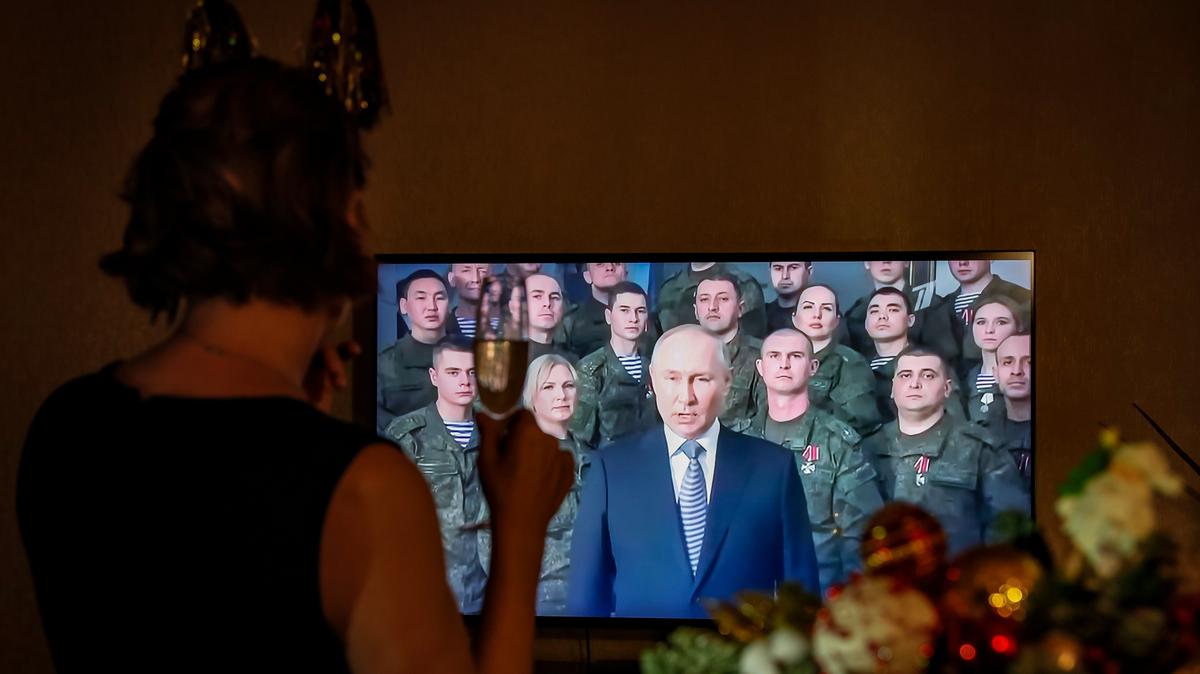Putin’s annual New Year’s address to the nation, which is recorded in advance and broadcast just before midnight on 31 December in Russia’s 11 time zones, was the most viewed programme on Russian state TV last year. Of course, that might be due to it being broadcast on multiple channels simultaneously and therefore hard to miss, but watching the presidential address is a New Year tradition that predates Putin for many Russian families.
From thaw to meltdown
The first ever televised New Year address to the nation was recorded in 1970 by Soviet leader Leonid Brezhnev. The eight-minute speech, during which Brezhnev read out the achievements of the country’s five-year plan from a piece of paper, aired shortly before midnight. By the mid-1970s, however, the New Year’s greetings were being read out by a TV presenter as Brezhnev’s deteriorating health forced him to abandon the ritual, something that his similarly afflicted successors, Yury Andropov and Konstantin Chernenko, were unable to rectify.
Mikhail Gorbachev revived the New Year’s speech tradition in 1985 with a 12-minute address that, while a slight improvement on Brezhnev’s, still felt more like an official party report rather than a heartfelt message of congratulation. In a perestroika crossover, Gorbachev and US President Ronald Reagan would record two New Year addresses together in 1987 and 1988.
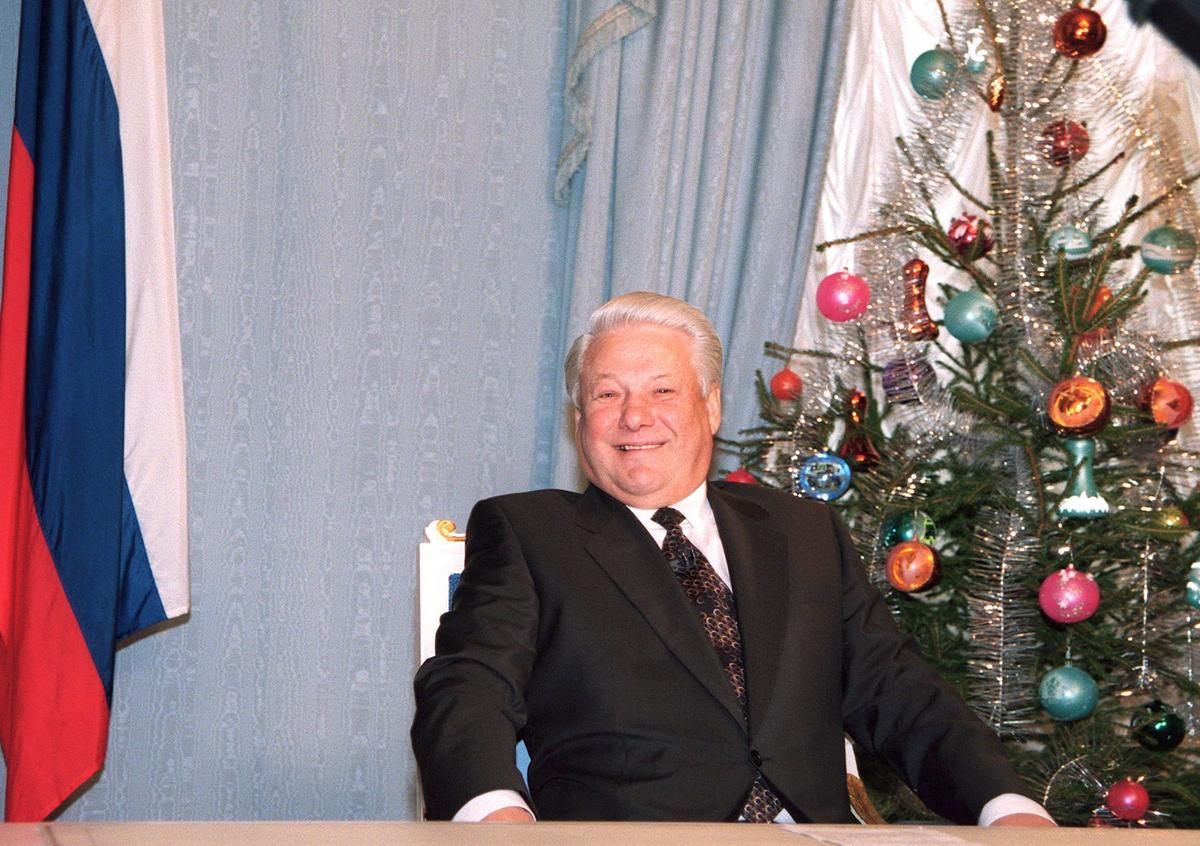
Russian President Boris Yeltsin in his office on 1 January 1995. Photo: EPA/DIMA TANIN
Following the collapse of the Soviet Union and the creation of the Russian Federation, Boris Yeltsin gave the speech a markedly more festive tone, featuring a Christmas tree and decorations in the background, and appearing to go for a more casual and relatable approach as the country plunged into the economic abyss. In his 1998 speech, Yeltsin’s family joined the president in raising a toast — the first-ever appearance by Russia’s “first family” in a leader’s televised address.
Few speeches in history can have had the impact of Yeltsin’s final address as president in 1999, still known in Russia as the “I’m leaving” speech, in which he unexpectedly resigned with immediate effect and introduced his successor — Prime Minister Vladimir Putin, who went on to give his first speech as acting president then and there.
Democratic façade

Putin during his first address as acting president, aired on 31 December 1999. Photo: kremlin.ru
Putin’s first address is striking in its democratic tone and is often used to illustrate the transformation from “early Putin” to the permanent dictator of today. Explicitly mentioning freedom of speech and freedom of the press as the “pillars of civilised society that will be protected by the state”, Putin says that Russia “is choosing the path of democracy and reform”.
However, Putin quickly reined in his enthusiasm for freedom and democracy following his election to the presidency in 2000, choosing to refer instead to the importance of “stability”, “safety”, and “predictability” in his subsequent speeches.
What’s striking when watching each year’s speech now is the fact that during his first two presidential terms (2000-2008), Putin never explicitly refers to specific contemporary events such as the Kursk submarine disaster, the Second Chechen war, or any of the multiple terrorist attacks that took the lives of hundreds of people in the early 2000s, referring to them euphemistically as “dramatic” events. Indeed, his speeches from that era barely differ from each other, containing the same platitudes and generic wishes of happiness, prosperity and success.
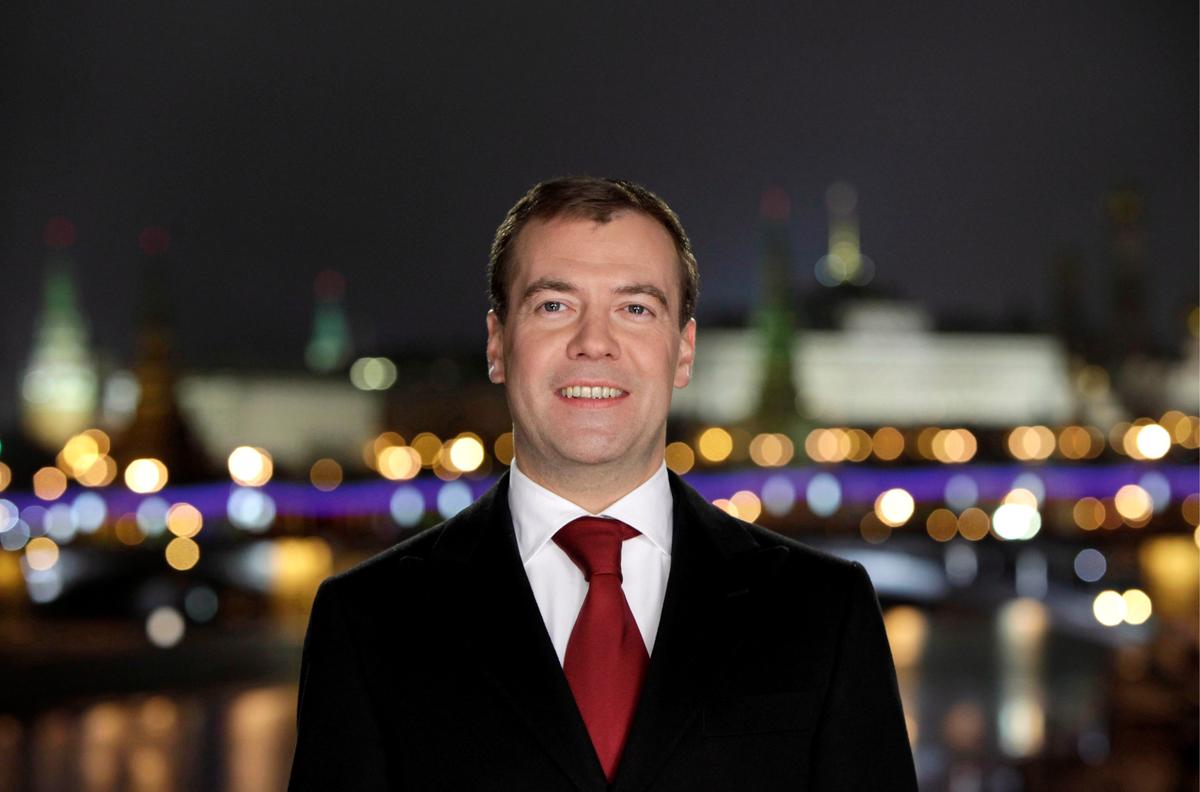
Russian President Dmitry Medvedev during his first New Year message, aired on 31 December 2008. Photo: EPA/ALEXANDRE ZEMLIANICHENKO / POOL
When Dmitry Medvedev took over as president in 2008 before Putin developed the confidence to change the constitution to prolong his rule indefinitely, he used the term “dramatic” in his first New Year’s speech too, seemingly as an homage to Putin.
Medvedev, then seen as a fresh face and a relative liberal, tended to give more concise speeches that had a pronounced focus on “modernity”. However, the pledge Medvedev made in his 2010 address that Russians would build “a modern, strong, open and friendly Russia together,” was derailed by Putin’s return to the presidency in 2012, amid a wave of violently put down popular protests.
Third time unlucky
Putin kicked off his third term with a speech that was striking in its boilerplate non specificity. “We hope for kind and happy changes,” he said, before adding that “our personal plans are inseparable from those of Russia, our homeland,” as if his riot police hadn’t just terrorised people peacefully protesting against his re-election and as if his intelligence agencies hadn’t just begun their systematic dismantling of the Russian opposition.
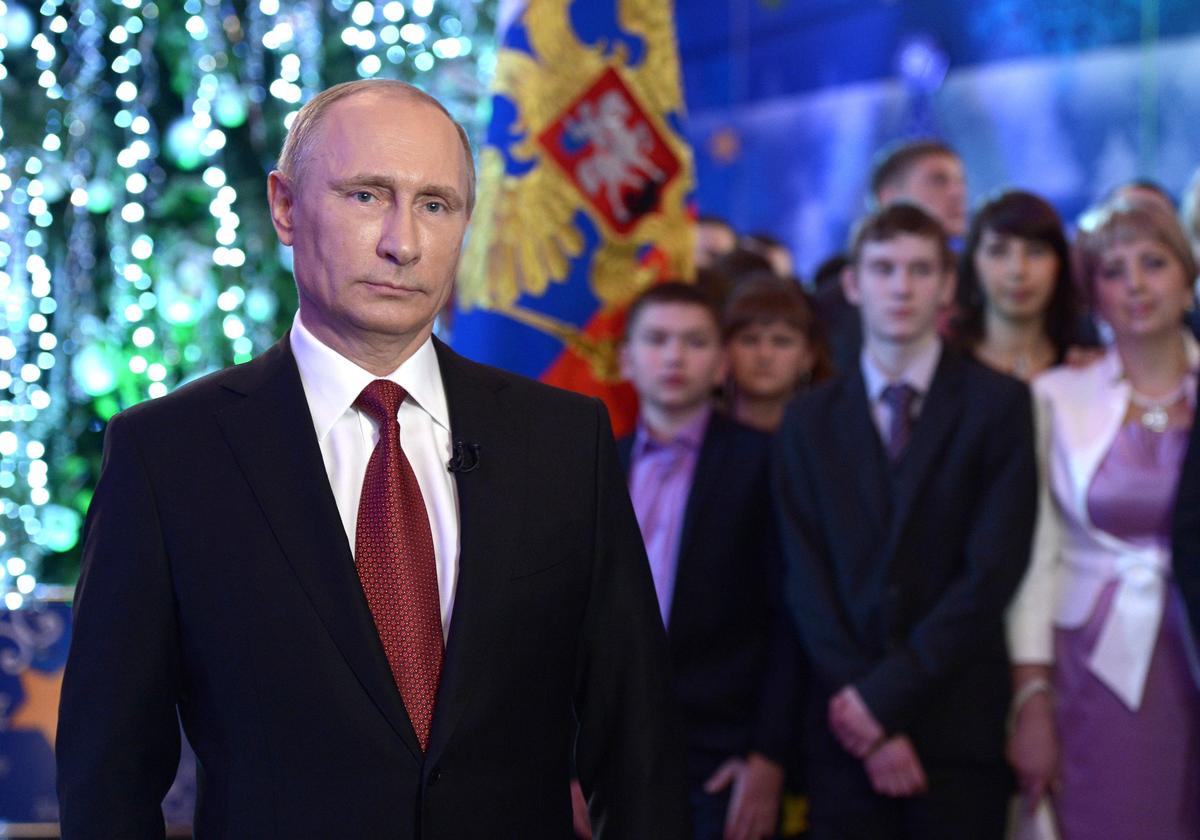
Putin makes his 2013 New Year address to the nation in the far eastern city of Khabarovsk. Photo: EPA/ALEKSEY NIKOLSKYI/POOL
Putin suddenly changed tack in 2013, however, and embraced specificity when he opted at the last minute to make his New Year address from the city of Khabarovsk as a show of solidarity with people affected by the flooding in Russia’s Far East. He also abandoned his by-now-familiar “happiness and prosperity” shtick and instead addressed the terror attacks that had taken place in Volgograd.
In 2014, on the heels of the successful Sochi Olympics came the annexation of Crimea and the intervention of Russia-backed separatists in eastern Ukraine. In that year’s address, Putin focused on the country’s triumph at the Olympics and the “brotherly support of the residents of Crimea and Sevastopol”, in a clear ploy to capitalise on the sky-high levels of public support for the illegal annexation. As Russia was still officially denying its presence in the country at the time, Putin remained silent on Russia’s dealings in eastern Ukraine.
Tool of war
Putin’s subsequent addresses gradually took on a more military theme as Russia got involved in the war in Syria and covertly sent its troops into eastern Ukraine to support Donbas separatist militias. In 2015, Putin gave a special mention to “those carrying out their military duty and ensuring our safety” and the “military officers fighting international terrorism and protecting Russia’s national interest”.
Thanking Russian military personnel for their service would become a staple of Putin’s later speeches, and something he went on to do almost every year. While every speech since 2014 contained the generic “happiness, family, and unity” platitudes, the military focus was becoming hard to miss, coming to a crescendo in 2022 following the full-scale invasion of Ukraine, when Putin abandoned any pretence of festive cheer excoriating the “Western elites” who “supported the neo-Nazis terrorising Donbas civilians”.
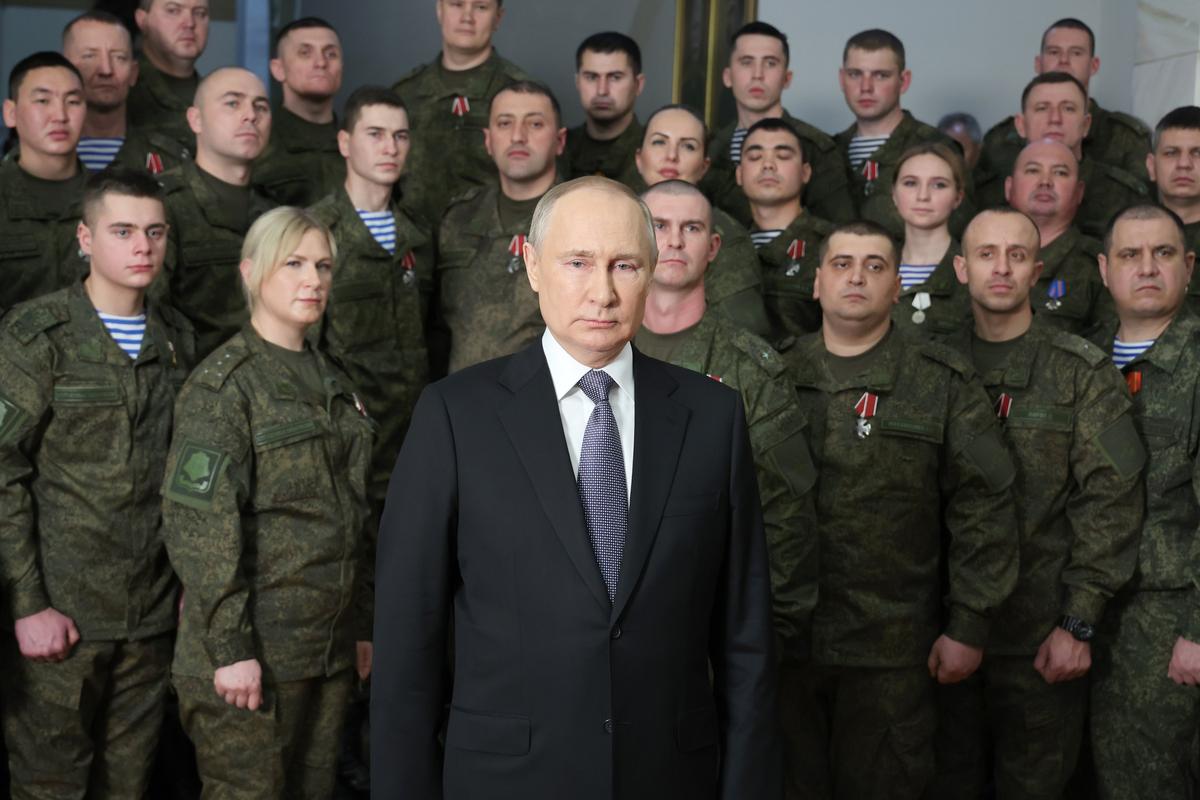
Putin’s 2022 New Year’s address. Photo: EPA-EFE/MIKHAEL KLIMENTYEV/SPUTNIK/KREMLIN POOL
Putin’s growing obsession with the cult of war culminated in the orgy of militaristic fervour that was on display in last year’s address.
Having for years nurtured a sense of apathy in his audience, Putin has begun to see his New Year address as an opportunity to communicate directly with Russians, to make his call for the Motherland to be protected at all costs in the interests of humanity.
This apathy, nurtured by years of benevolent and comforting — if meaningless — speeches, is now being fused with calls to defend the motherland for the good of all mankind. By marrying these two concepts, Putin appears keen to create a population meek enough not to rebel, but sufficiently patriotic to sacrifice itself for whatever Putin might decide needs “defending” next.
Join us in rebuilding Novaya Gazeta Europe
The Russian government has banned independent media. We were forced to leave our country in order to keep doing our job, telling our readers about what is going on Russia, Ukraine and Europe.
We will continue fighting against warfare and dictatorship. We believe that freedom of speech is the most efficient antidote against tyranny. Support us financially to help us fight for peace and freedom.
By clicking the Support button, you agree to the processing of your personal data.
To cancel a regular donation, please write to [email protected]
